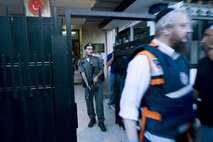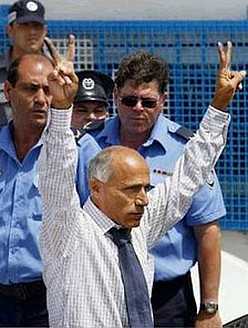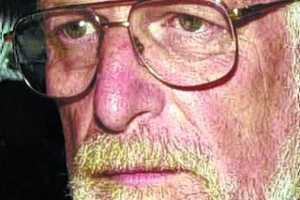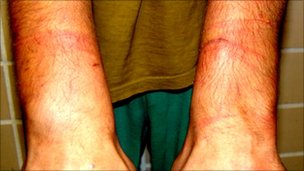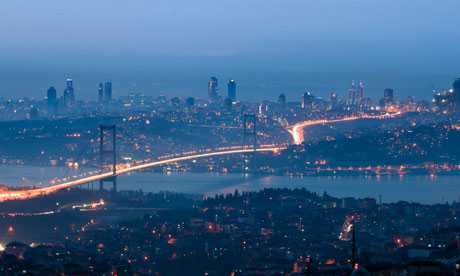Turkey has traditionally been known as the gateway to the East and is typically coupled with the Middle East and Africa in the geographic divisions of many large companies. Yet its economy – the 15th largest in the world – sends half of all its exports to Europe.
By Andrew Cave

This is a situation that Turkey, and Istanbul in particular, has been used to for centuries, given the nation’s place on the ancient trade routes.
With Turkey opening up more to Western investment in recent years, however, the nation is increasingly attractive to small and medium-sized businesses looking to explore growth opportunities as part of the next stage of their strategy.
This is why Turkey has been selected as the second destination in the series of trade visits being organised by HSBC Bank as part of its Business Thinking initiative.
The programme, run in partnership with Telegraph Media Group, aimed at finding and rewarding innovative and different ways of approaching business, is offering 18 winning companies up to £90m of loans, which come with a financial reward of up to £200,000.
In addition, dozens of people from shortlisted companies are to be flown to networking events in the Americas, Europe and Asia.
They will meet some of the foremost management thinkers in their business fields. The Turkey visit will take place in mid-September.
Turkey is a founding member of the Organisation for Economic Co-operation and Development (OECD) and the G20 group of major economies.
It had a growth rate averaging an annual 6.8pc from 2002 to 2007, making the nation one of the fastest growing economies in the world.
The country also has an unusually young demographic profile, with more than half of its 72m people aged below 30 and a median age of 27.
Murat Ulgen, HSBC’s chief economist for Central and Eastern Europe and Sub-Saharan Africa, is predicting gross domestic product (GDP) growth of 6pc this year and around 4.5pc in 2011, following a sharp contraction of 4.7pc in 2009.
The bank is also forecasting Turkish exports of about $115bn (£74bn) this year, a stable central bank interest rate of 7pc and a range of between 7.5pc and 8pc for the annual rate of inflation by the end of 2010.
The unemployment rate is running at 12pc, while Turkey’s budget deficit is between 4pc and 4.5pc of GDP and its total external debt stock works out at about 40pc of GDP.
By the end of this year, Mr Ulgen is forecasting, the size of the Turkish economy will be $720bn, representing per capita income of about $10,000. The current exchange rate is 2.38 Turkish lira to the pound.
In past decades, Turkey has been a byword for high inflation and an unstable economy but reforms were enacted following the economic crisis of 2001 and a new currency, the Turkish new lira (later renamed once again as the Turkish lira) was launched in 2005.
Inflation was driven down to single digits, while the unemployment rate also fell and investor confidence grew.
A series of large privatisations, the stability fostered by the start of Turkey’s EU accession negotiations, strong and stable growth, and structural changes in the banking, retail, and telecommunications sectors have all contributed to a rise in foreign investment.
Turkish tourism has also experienced rapid growth in the past 20 years, and constitutes an important part of the economy. In 2008, there were nearly 31m visitors to the country, contributing $22bn to Turkey’s revenues.
Mr Ulgen believes that such developments meant that Turkey suffered less than many other nations in the recent global financial crisis.
“During the global recession, we were lucky,” he says, “because we had a very strong banking industry.
“Unlike a lot of Europe and the US, the Turkish banking system was very strong, with high capital adequacy ratios, which was a big advantage. Turkey’s recovery has been very impressive.”
Turkey has a large and growing automotive industry, which produced 1.1m cars in 2008, ranking as the sixth largest producer in Europe, one place behind Britain, and the 15th largest producer in the world.
It produces more cars than Italy and is also one of the world’s leading ship-building nations, ranking fourth behind China, South Korea and Japan in the numbers of ships ordered and also fourth behind Italy, the US and Canada in the number of ordered super-yachts.
Turkish brands such as BEKO and Vestel are among the largest producers of consumer electronics and home appliances in Europe.
Mr Ulgen says the best sectors for British companies to target for exports are durable and white goods manufacturers, the automotive industry, the energy sector and infrastructure projects.
At present, he says, Turkey’s domestic economy is much stronger than its export economy so UK companies may be better advised to seek sales in Turkey itself, rather than look to use the country as a hub for exporting elsewhere.
Virma Sokmen, HSBC’s head of corporate banking in Turkey, adds that because of its young population, Turkey is dynamic and enterprising.
However, she warns that the most successful Western companies in the country have been those, such as Unilever, Cadbury and Reckitt Benckiser, that have adapted their offerings and business practices to take account of Turkey’s very strong and individual culture.
“Turkey has a very collective and common culture,” she says. “Turkish people value global brands but they also want to see respect for Turkish culture.
“They will want to spend time with you and perhaps your shareholders before committing to business. They are warm and hospitable people and will want to meet over lunch or dinner and get to know who they are dealing with.”
Turkey is also quite a highly-regulated environment and Ms Sokmen says that some foreign firms coming into Turkey like to do so through a partner or advisers.
“You do need to build relationships,” she says, “but there are lots of business opportunities in Turkey for companies that take the time and make the effort to adapt.”
http://www.telegraph.co.uk/finance/economics/7945717/Turkey-is-an-ancient-trade-hub-with-a-bright-future.html, 14 Aug 2010

